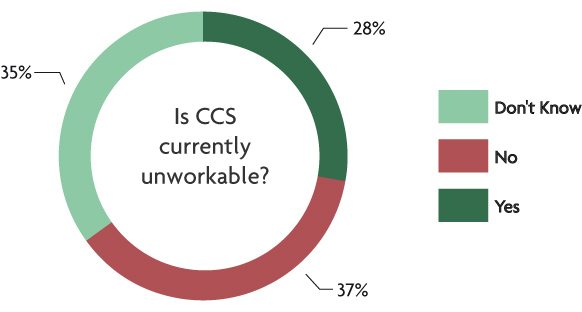As we explored in an Analysis piece in February, immediately following the 2015 Autumn Statement the Government issued a statement to the London Stock Exchange declaring that the previously ring-fenced £1bn for a Carbon Capture and Storage (CCS) competition was to be scrapped less than six weeks before the money was due to be awarded.
The statutory body tasked with setting the country’s carbon budgets, the Committee on Climate Change (CCC), have stated that without CCS the cost of achieving the fifth budget, the most recent set by the body and covering the period of 2028-2032, would be double that of a plan that included the technology.
Following these announcements, David Cameron declared that the government should decide “about technology that works ... [or] isn’t working,” so we asked you whether CCS is currently unworkable. The results are in...

... and are anything but conclusive:
- 37 per cent said that CCS is not currently unworkable, i.e. it is workable;
- 28 per cent stated that CCS is currently unworkable; and
- 35 per cent, however, stated that they didn’t know.
So whilst the largest proportion of the membership is in favour of government support for CCS, this is far off an overall majority and a similar percentage feels unable to say either way. The opponents to the workability of the technology only trail the proponents by nine percentage points.
The Government currently states that the UK’s carbon emissions are falling and have been for some time and policies like the closure of all coal fired power stations by 2025 only further push the UK in this direction. The CCC on the other hand don’t believe the Government is doing enough and urge them to adopt policies that more actively encourage low carbon innovation. They say that the current situation is based on warmer winters and an increased reliance on natural gas. This is therefore not a particularly sustainable strategy, especially if more substantial cuts are required in a short period of time.
A significant proportion of respondents did not feel qualified to state whether CCS is currently workable for the British Government; this is a valuable point to explore further. Is this because of uncertainty about what is within the fiscal interest of the government, a lack of a detailed understanding of the technology, or an ideological opposition to any technology that buoys carbon intensive processes, even if just for the time-being?
What is clear is that CCS remains divisive; approximately 30% of respondents finding that CCS is currently unworkable is indicative of the challenges that the technology faces more generally. The question still looms: is a low/ zero carbon economy achievable without a means of actively removing carbon from the equation?
For more on this topic from the IES take a look at:



